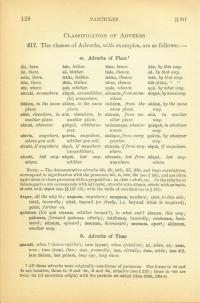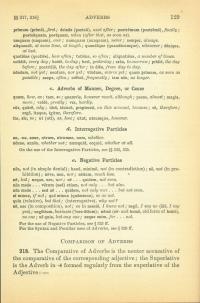217. The classes of Adverbs, with examples, are as follows.
a. Adverbs of Place1
| hīc here |
hūc hither |
hinc hence |
hāc by this way |
| ibi there |
eō thither |
inde thence |
eā by that way |
| istīc there |
istūc thither |
istinc thence |
istā by that way |
| illīc there |
illūc thither |
illinc thence |
illā (illāc) by that way |
| ubi where |
quō whither |
unde whence |
quā by what way |
| alicubi somewhere |
aliquō somewhither |
alicunde from somewhere |
aliquā by some way |
| ibīdem in the same place |
eōdem to the same place |
indidem from the same place |
eādem by the same way |
| alibī elsewhere, in another place |
aliō elsewhere, to another place |
aliunde from another place |
aliā in another way |
| ubiubi wherever |
quōquō whithersoever |
undecunque whencesoever |
quāquā in whatever way |
| ubivīs anywhere, where you will |
quōvīs anywhere, whither you will |
undique from every quarter |
quāvī by whatever way |
| sĭcubi if anywhere |
sīquō if anywhere, (anywhither) |
sīcunde if from anywhere |
sīquā if anywhere |
| nēcubi lest anywhere |
nēquō lest anywhither |
nēcunde lest from anywhere |
nēquā lest anywhere |
Note— The demonstrative adverbs hīc, ibi, istīc, illīc, and their correlatives, correspond in signification with the pronouns hīc, is, iste, ille (see § 146), and are often equivalent to these pronouns with a preposition
inde = ab eō, etc.
So the relative or interrogative ubi corresponds with quī (quis), ali-cubi with aliquis, ubiubi with quisquis, sī-cubi with sīquis (see § 147 - § 151, with the table of correlatives in § 152).
ūsque all the way to
usquam anywhere
nusquam nowhere
citrō to this side
intrō inwardly
ultrō beyond (or freely, i.e. beyond what is required)
porrō further on
quōrsum (for quō vorsum whither turned?) to what end?
hōrsum this way
prōrsum forward (prōrsus utterly)
intrōrsum inwardly
retrōrsum backward
sūrsum upward
deorsum downward
seorsum apart
aliōrsum another way
b. Adverbs of Time
quandō when? (interrogative)
cum (quom) when (relative)
ut when, as
nunc now
tunc (tum) then
mox presently
iam already
dum while
iam diū, iam dūdum, iam prīdem long ago, long since
prīmum (prīmō) first
deinde (posteā) next after
postrēmum (postrēmō) finally
posteāquam, postquam when (after that, as soon as)
umquam (unquam) ever
numquam (nunquam) never
semper always
aliquandō at some time, at length
quandōque (quandōcumque) whenever
dēnique at last
quotiēns (quotiēs) how often
totiēns so often
aliquotiēns a number of times
cotīdiē every day
hodiē today
herī yesterday
crās tomorrow
prīdiē the day before
postrīdiē the day after
in diēs from day to day
nōndum not yet
necdum nor yet
vixdum scarce yet
quam prīmum as soon as possible
saepe often
crēbrō frequently
iam nōn no longer
c. Adverbs of Manner, Degree, or Cause
quam how, as
tam so
quamvīs however much, although
paene almost
magis more
valdē greatly
vix hardly
cūr, quārē why
ideō, idcircō, proptereā on this account, because
eō therefore
ergō, itaque, igitur therefore
ita, sīc so
ut (utī) as, how
utut, utcumque however
d. Interrogative Particles
an, -ne, anne, utrum, utrumne, num whether
nōnne, annōn whether not
numquid, ecquid whether at all
On the use of Interrogative Particles, see § 332, § 335.
e. Negative Particles
nōn not (in simple denial)
haud, minimē not (in contradiction)
nē not (in prohibition)
nēve, neu nor
nēdum much less
nē lest
neque, nec nor
nē . . . quidem not even
nōn modo . . . vērum (sed) etiam not only . . . but also
nōn modo . . . sed nē . . . quidem not only not . . . but not even
sī minus if not
quō minus (quōminus) so as not
quīn (relative) but that (interrogative), why not?
nē, nec (in composition) not (so in nesciō I know not)
negō I say no (âiō I say yes)
negōtium business (†nec-ōtium)
nēmō (nē- and hemō, old form of homō) no one
nē quis lest any one
neque enim for . . . not
For the use of Negative particles see § 325 ff.
For the Syntax and Peculiar uses of Adverbs, see § 320 ff.


